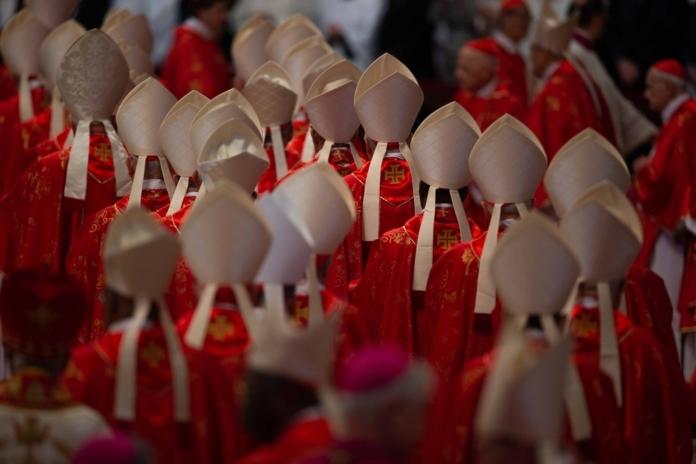The delegates of Germany’s “synodal path” met in Frankfurt last week for a three-day meeting to set the agenda for future meetings.
Newsroom (October 5, 2021 – 10:04 AM Gaudium Press) – The meeting agenda was to debate and vote on topics for future discussion, based upon draft position papers developed by synod working groups. Those papers could eventually form the basis for a final set of proposals from the synodal delegates — a group that includes both Germany’s bishops and lay representatives from the Zdk — a quasi-official Association of German lay Catholics.
There will be a lot of debate before final synod votes in 2023 — the papers drafted thus far are thought to represent starting points in the discussion, not definitive outcomes.
‘New evangelization’ call accepted
One proposed amendment called for the Church’s mission of evangelization to be placed at the center of the synod’s deliberations, texts, and implementation.
Ninety-four participants voted for the “evangelization amendment,” 86 voted against it, and there were 15 abstentions. Synod organizers announced Thursday that the amendment, which needed a simple majority, had passed. But after a few minutes, a moderator took the floor, telling that the meeting’s rules required abstentions to count against the motion, which meant it had failed.
The decision was met with frustration by delegates. — both those who had voted for the motion and those frustrated by ambiguity in the rules. The following day — Oct. 1 — synod officials announced they should not have counted abstentions as “no” votes and that the motion, which called for a stronger focus on evangelization at the synod, had passed — even with a minority of total voters supporting it.
“Re-examination” of the Church’s teaching on sexual morality
Nearly 80% of synod delegates voted to approve a text that would call for a “re-examination” of the Church’s teaching on sexual morality and include a call for the liturgical blessings of same-sex couples.
The vote was on an initial reading of the text. Delegates voted to approve it for further discussion and deliberation in later stages of the synod process, not to give it final approval in its current form. However, the number of delegates who voted in favour of the proposal was 168, of 214. Tue outcome suggests that the majority of voters might approve the proposal next year.
Should this happen, the synod would confront a March instruction from the CDF: it directly prohibits such blessings.
Ultimately, the synod rules require that proposals receive a two-thirds majority of votes among the German bishops to be passed as norms for the Church in Germany.
The documents being discussed right now are effectively non-binding resolutions and will remain that way unless they are passed, in one form or another, by two-thirds of the German bishops during the final session of the synod, which has been pushed back to 2023.
If the bishops do end up supporting proposals contravening Catholic doctrine or reject the direction and guidance of the Holy See, the possibility that the synod could lead to some formal schism or separation between Rome and Germany would be heightened. The Vatican, in turn, would almost certainly have to respond to a formal vote of bishops opposing Catholic teaching. Pope Francis has already cautioned bishops to uphold the doctrine and urged them to focus the synod on evangelization.
Re-defining Priesthood?
German media reported Saturday that the assembly had voted to approve a document calling for the abolition of the sacramental priesthood in the life of the Church.
After the meeting ended on Saturday, church officials, including German bishops’ conference president Bishop Georg Batzing, said this was a misunderstanding. Batzing said the discussion is about reimagining what the priesthood might look like and how it would fit into a theology supportive of the universal priesthood of believers.
The bishop said many delegates are concerned about abuse of power and office and wanted to discuss new approaches to sacramental ministry.
Some delegates have called for a kind of de-professionalization of the clerical state or one in which priests are not regarded as distinct from the lay communities they serve as a way of addressing “structural power imbalances.” Others have called for an even more radical reimagining of the sacramental order. In contrast, numerous delegates have called for the ordination of women to the priesthood, which the Church says it does not have the power to do.
During the meeting, a document addressing those issues was narrowly passed by only one vote and will be the subject of further debate. But Batzing, for his part, disputed the notion that such ideas could be called “abolishing the priesthood.”
In Conclusion
The meeting on Saturday waned during deliberations over a final agenda item; there was not a quorum to vote upon it because many delegates had already left the meeting. While officials say the meeting was a good step in the process, it also revealed deepening fault lines between Germany and Rome and ambiguities in the procedural rules that will likely be discussed before the meeting’s subsequent sessions.
There will be several synod sessions in 2022, and the final assembly session is not set for 2023.


































